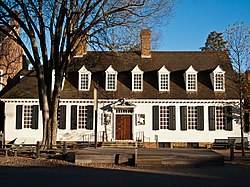Raleigh Tavern
|
Raleigh Tavern
|
|

Reconstructed Raleigh Tavern from Duke of Gloucester Street
|
|
| Location | Williamsburg, Virginia |
|---|---|
| Built | 1930-31 |
| Architectural style | Colonial Revival |
| Part of | Williamsburg Historic District (#66000925) |
| Added to NRHP | October 15, 1966 |
The Raleigh Tavern was a tavern in Williamsburg, Virginia, and was one of the largest taverns in colonial Virginia. It gained some fame in the pre-American Revolutionary War Colony of Virginia as a gathering place for legislators after several Royal Governors officially dissolved the House of Burgesses, the elected legislative body, when their actions did not suit the Crown. It was also the site of the founding of the Phi Beta Kappa Society on December 5, 1776.
Rebuilt in 1930–31, it was both the first building to be reconstructed and to be opened as part of Colonial Williamsburg. Unlike several other taverns in Williamsburg which operate as restaurants or inns, the reconstructed Raleigh Tavern building serves as a museum, showing visitors what the tavern would have appeared like.
It was named after Sir Walter Raleigh, an important figure in the English settlement of Virginia. A lead bust of Raleigh sat above the entrance door.
From 1699 to 1779, Williamsburg served as the capital of the colony of Virginia. As such, there were numerous taverns to host legislators and other visitors having business with the government while the House of Burgesses was in session.
The original tavern is believed to have been built some point prior 1735. It changed ownership and keepers numerous times, continuing in use as a tavern, eventually being acquired by local cabinetmaker Anthony Hay (father of jurist George Hay) in 1767.
The tavern was an institution in Williamsburg; auctions as well as balls were held under the Raleigh's aegis. The tavern was the site of reception dinners held for at least two Royal Governors upon their arrival to Virginia: Robert Dinwiddie in November 1751, and Lord Botetourt in October 1768.
In May 1769, the Raleigh Tavern began its role as a center of sedition when the Governor Botetourt dissolved the House of Burgesses, because of resolutions against the Townshend Acts. After its dissolution, the burgesses immediately convened in the Apollo Room as the 'late representatives of the people' and adopted the Non-Importation Agreement. The House of Burgesses was reconvened by the Governor in November that year.
...
Wikipedia
